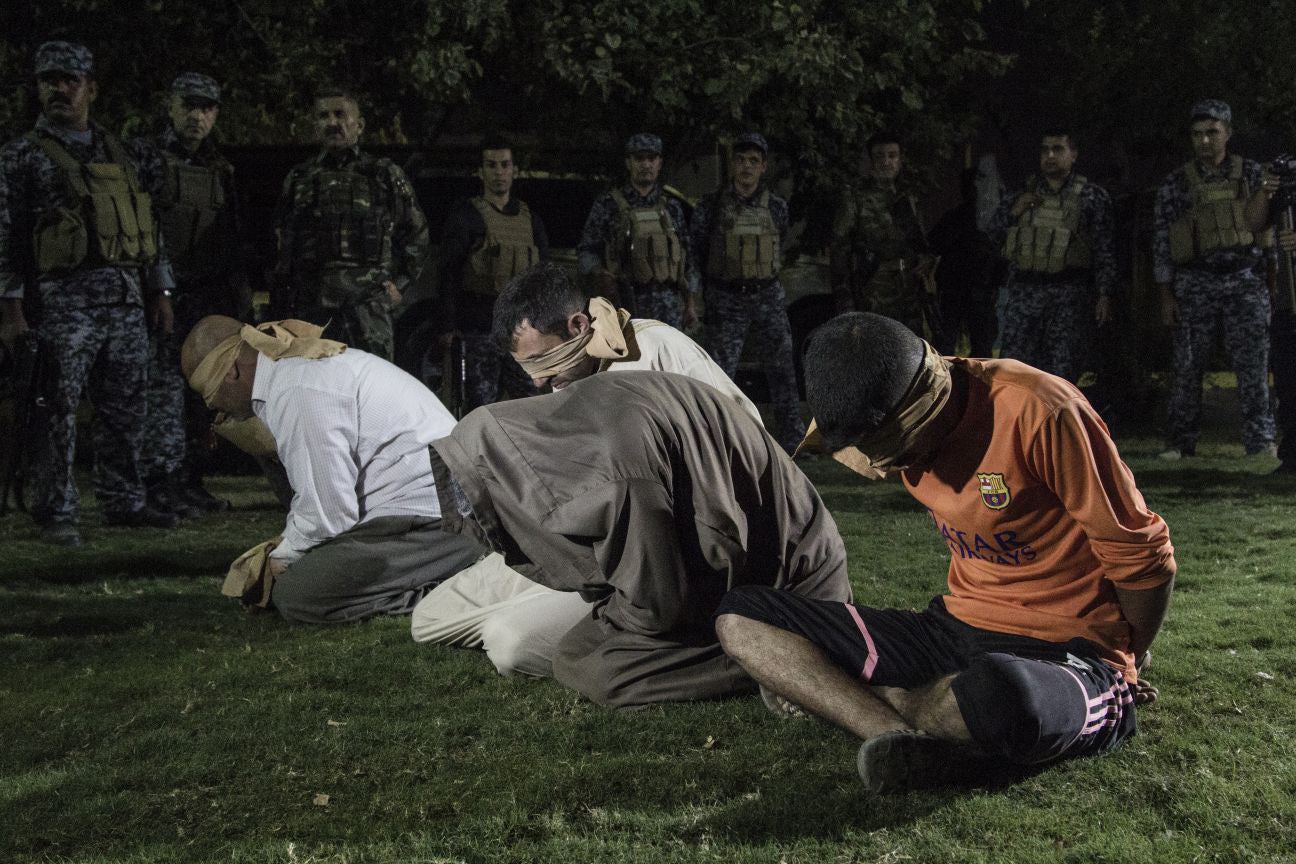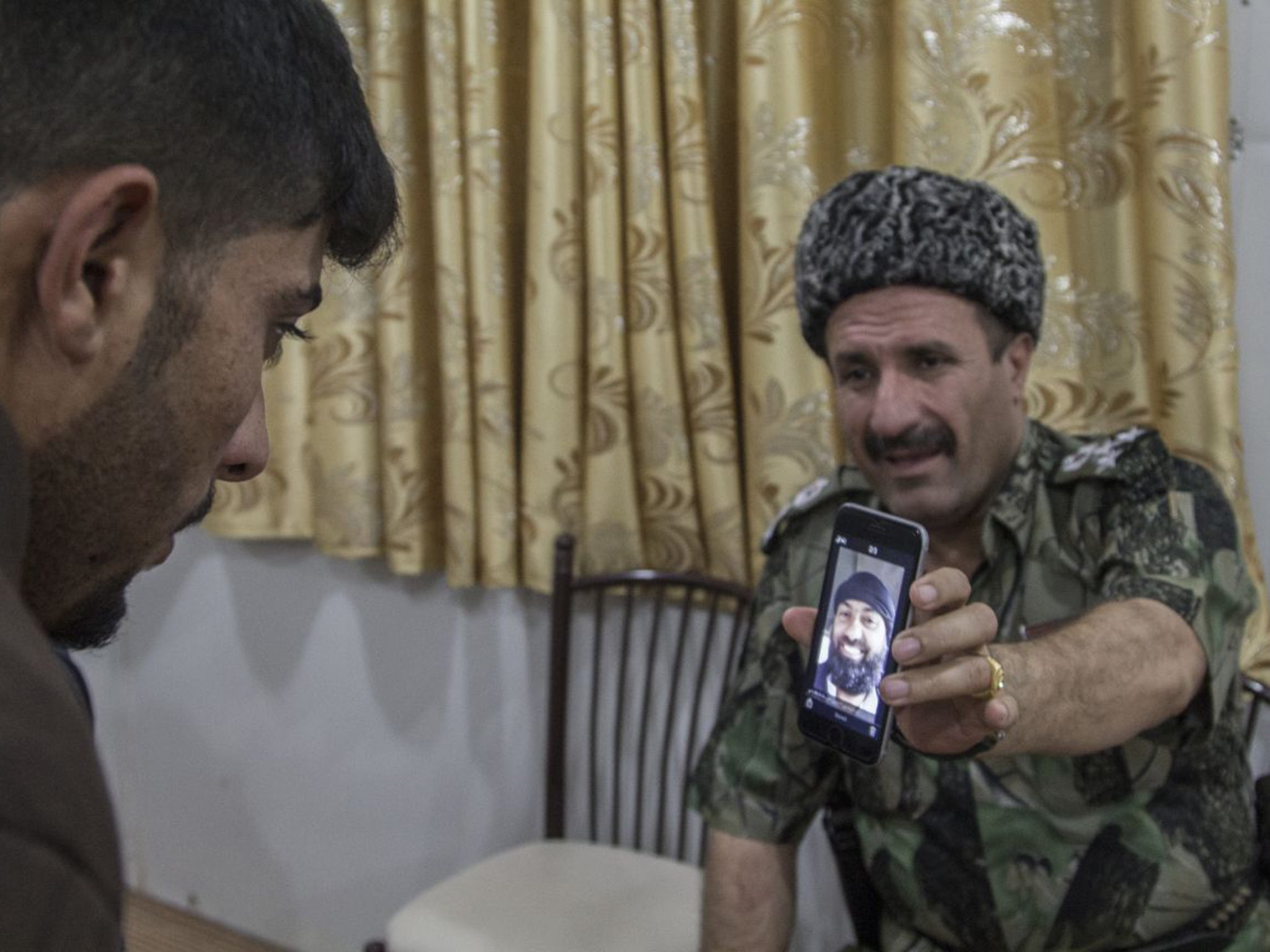Isis in Iraq: On the hunt for jihadist fighters with Kirkuk’s chief of police
As the battle against the militants rages in Iraq, officers seek to round up supporters on the streets

The blindfold was lifted from the face of the 23-year-old and he looked around, blinking, at the garden of the police headquarters. He had been arrested three days earlier by Kirkuk’s imposing district police chief, Brigadier General Sarhad Qadir, now he was passing information about Isis. “It’s like a net, we capture one after the other,” said Brigadier Qadir, adding “this guy is giving good information”.
The informer, Wahid (not his real name), wore a blue and yellow tracksuit that looked too thin for the season, he said he was a former member of al-Qaeda who later joined Isis. The police planned to take Wahid as a guide that evening as they hunted down the rest of his alleged cell, who police accused of carrying out multiple assassinations and car bombings in Kirkuk.

The city, in northern Iraq is under Kurdish control, but towns held by Isis are not far away. As Britain begins air strikes against the group in Syria, in Iraq regular night raids – mostly rounding up men in Sunni Arab communities – are part of counter-terror operations to fight the jihadists, in addition to the war on the front lines and US-led coalition air strikes. However, targeting Sunni Arab towns threatens to marginalise them further from the Shia-led government – something which experts say was a factor in the rise of Isis, and could deepen divides between the Sunni and Shia populations in the country.
“Isis’s goal is to kill all humanity, I was wrong and now I’m giving information to correct myself,” said Wahid. Brigadier Qadir sat very close keeping a watchful eye, joking with the detainee and passing him a cigarette. Wahid said he fought with Isis in the oil refinery town of Beiji and in Tikrit for a salary of around 300,000 Iraqi dinars (£180) a month which often arrived late. He complained that the Shia militia killed many of his fellow fighters. He said he rejected the use of mass killings and rape by Isis. “Only the leaders do that stuff,” he said, “we’re only soldiers taking commands.”
After speaking he was blindfolded again, and led away to a line of police trucks mounted with machine guns. The hunt was on.

It was dark when the convoy entered Chardakhlo. Torch light flickered over the squat roofs of mud and cinder-block homes. Dogs barked and a man in a long robe was visible in the headlights for a moment, darting between two houses. The police shouted, raising their guns and pushing their way through doorways as they looked for men, weapons and potential evidence.
A leading Sunni Arab lawyer in Kirkuk – who asked not to be named due to safety concerns – said that in many cases under the anti-terror law not enough evidence is found for a conviction, or some cases had been thrown out when a doctor’s note was produced confirming the confessions had been obtained through force.
Major General Jamal Tahir, the head of police in Kirkuk, denied that force was used during interrogations; he said he tells his men never to do this because their work will be useless, and the cases will be thrown out. He said that there are more than 300 prisoners being held in Kirkuk under the anti-terror law, mostly detained in the last year.
However, international rights groups have raised concerns. “We are hugely concerned about what’s going on with detentions throughout Iraq,” said Donatella Rovera, senior crisis response adviser with Amnesty International. She added that “In Iraq proper [outside the Kurdistan Region] people are often killed by the Shia militias instead of being detained; or they are being killed before they make it to a place of detention, others have been held for ransom and then killed.
“In the KRG [the area administered by the Kurdistan Regional Government] there is less of a problem of killing, and the number of people being detained is significantly smaller ... but there is equally an issue of lack of transparency as to the fate of detainees. Monitoring is at best extremely difficult.”
Kirkuk is Kurdish-controlled, with security forces present from the Kurdistan region. However, Brigadier Qadir’s force comes under the control of the central government in Baghdad.
The lawyer from Kirkuk said that families of detainees are sometimes unsure which force is holding their relative, and that sometimes it is dangerous for lawyers in the city to represent prisoners held under the anti-terror law.
Ms Rovera said that this was a “huge problem throughout Iraq” especially since summer 2014. “Even people who have been detained for several years have been moved, and their families don’t know where they are or even if they are alive or dead,” she said.
During the evening raid in Kirkuk, a woman stood by her gateway and protested as dozens of police ran through her front yard and into the house behind her, taking away a young man in a green tracksuit. “My brother is in the peshmerga!” she said with tears in her eyes, referring to the armed forces of the Kurdistan region.
A policeman kicked another suspect who lay in a foetal position in the bed of a pick-up truck. In a nearby house, police searched for a suspect who had vanished. Two women with children cowered by the bed, which looked like it had been slept in moments before. “We are looking for a man who is transferring weapons to Isis with his van,” said Brigadier Qadir. “His clothes are on the bed. He was sleeping with his wife when we came and he had the chance to flee.”
The police ran past sleeping children and lifted carpets, searched in outhouses and in air-conditioning units. Outside a policeman shouted at a group of women who stood in the shadows, “Go inside! Go inside!” A woman from the family of a man who had just been seized stepped forward, “Why! What are you going to do?” she screamed at him, her voice hoarse with emotion.
Later, on the grass of the headquarters, the five suspects squatted like blind pigeons, their noses almost touching the ground and their sandaled feet caked in dust. “We got all five apart from the one who had the chance to flee,” said Qadir, looking down at the men who were silent.
A few nights after the raid the suspects were brought to the police headquarters. They were being investigated and awaiting trial said the police. A policeman offered them small plastic cups of water as they sat down. Outside there was a short burst of gunfire. The police asked the prisoners questions from a per-prepared list and looking straight ahead, one by one, they confessed.
Join our commenting forum
Join thought-provoking conversations, follow other Independent readers and see their replies
Comments
Bookmark popover
Removed from bookmarks